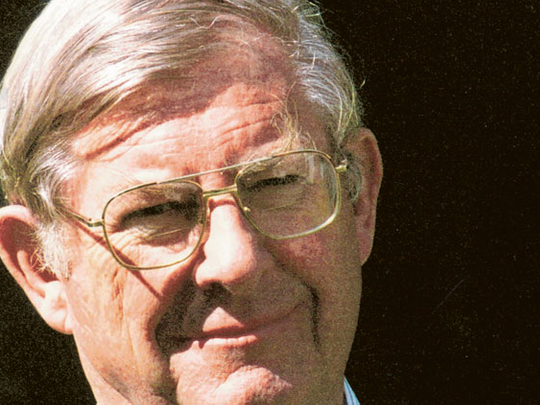
At the age of 24, Michael Curtis made his way to the Trucial States, a desert hinterland inhabited by scattered tribal shaikhdoms. He spent two years with the Trucial Oman Scouts in various outposts across the area before the states were unified by Shaikh Zayed Bin Sultan Al Nahyan to become what is now known as the United Arab Emirates.
His two-year stint in the region is described in a book he co-authored with Anthony Cawston titled Arabian Days; Memoirs of Two Trucial Oman Scouts, which depicts an era largely forgotten by the business powerhouse the country has become today. His memoirs offer an enlightening window into the land and people that existed before oil was found.
Curtis' adventure into the then largely undeveloped region began in Aden, Yemen, where he was sent to study Arabic for three months before flying on towards Sharjah. "This is quite laughable because if the ministry of defence had cared to look up my records they'd find I'd got 7 per cent at French oral O level and 20 per cent at French written O level. Arabic is a very tricky language to learn but I stuck it out and after three months I went up to Sharjah, where Aden Arabic and Gulf Arabic are as different as Cockney and Gaelic to me," Curtis said.
With the basics of Arabic under his belt, Curtis set out to his new post. The Trucial Oman Scouts was formed in 1951 to serve in the Trucial States as a result of the treaty that was signed in 1820. Curtis's duty as a squadron commander, having been seconded from the British Army's Royal Hampshire Regiment, lasted for two years — 1966 and 1967.
The scouts were assigned a number of tasks depending on which area they were posted in. These mostly consisted of visiting different villages and carrying out health checks, maintaining peace between the different tribes and preventing smuggling and illegal immigration.
"Smuggling and illegal immigrants were the main issues," Curtis said. "There was a lot of dhow traffic between the Emirates, Pakistan and India. One time we had to look at this dhow which was extremely heavy in the water. We emptied it out, and it turned out to be filled with gas cylinders which had been brought because it was cheaper to fill up in Dubai than in Pakistan."
Curtis described how dhows would creep up to the coast in the middle of the night, dump illegal immigrants and the dhow crew would point them in the direction of Dubai. Curtis's duty was to turn them around and send them away. Or else they would be put in a barbed-wire-fenced compound in Khor Fakkan, the dhow captain and his crew would be taken to the crown court in Dubai, fined very heavily and told to go away. "We did that for two to three weeks and people got the idea very quickly," said Curtis.
According to Curtis, the biggest dangers they faced in those days were traffic accidents and boredom. "Roads out there were 5 miles [8 kilometres] wide and the Bedouin still managed to hit each other," he recalled.
Entertainment was limited. "We were in these locations for 24 hours a day without much entertainment. In Dubai there was one hotel called the Riviera where they had one bar. Lots of shops were coming along like Jashanmal and, of course, you had the odd film in the camp. Sharjah was the best place to be stationed in because you could sail and do water-skiing," Curtis said.
The Scouts also had bases at Mirfa, Buraimi, Masafi and Manama, but Sharjah's was the most luxurious with air-conditioned rooms and good food. "Sharjah creek was the main hub for commerce. Right up until the early Sixties it was from where all the dhows left for India and Pakistan," Curtis said.
In Mirfa, they were stationed in old oil-company shacks on a sandy spit near the sea which Curtis describes as "hot, humid and evil". In Buraimi, they lived in Fort Jahili which was hot but not as humid. In Masafi, their accommodation was barasti huts with a tent attached and very basic plumbing. The sparse and sometimes treacherous land Curtis came to was completely different from the built-up, cosmopolitan cities that make up the UAE today. The journey between Dubai and Abu Dhabi used to take four hours instead of the two hour journey it is today. The trip between Abu Dhabi and Al Ain was a particularly dangerous one, involving some driving over dunes and quicksand "I've seen a camel get sucked in that in 10 minutes," said Curtis.
The route from Al Ain to Dubai was also quite tricky. "I had two basic options on which way to come from Al Ain to Dubai. If I left at 4am, I could go over an area of dunes which spread north over Buraimi Oasis. If you went early enough there was still dew on the ground and the Land Rover would be able to bounce over that quite easily. If you went any later you got stuck. The only alternative was to go through Muscat territory through Wadi Mahdah and come up near what is now known as Fossil Rock," said Curtis.
After leaving the army in 1972, Curtis stayed in the Middle East working first for the Boots Company in Beirut and Amman and Spinneys in Dubai and Muscat. It was during these years he pieced together his memoirs.
"I took my first crack at it when I was working for Spinneys in 1986. I used to write up the various parts never thinking I'd be writing a book. A great friend of mine, Anthony Corsten [a fellow Scout] offered to put his notes together with mine to make a book," Curtis said.
Michael Curtis will be appearing at the Emirates AirlineFestival of Literature, to be held from March 6 to March10 at the InterContinental Hotel, Dubai Festival City andthe Cultural and Scientific Centre, Al Mamzar.








